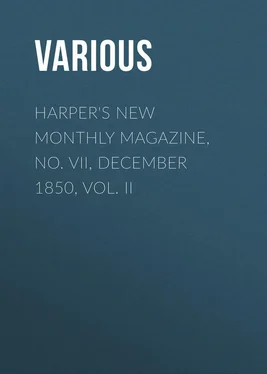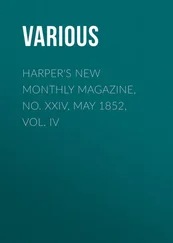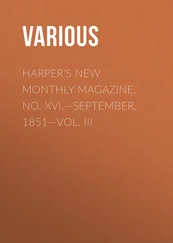Various - Harper's New Monthly Magazine, No. VII, December 1850, Vol. II
Здесь есть возможность читать онлайн «Various - Harper's New Monthly Magazine, No. VII, December 1850, Vol. II» — ознакомительный отрывок электронной книги совершенно бесплатно, а после прочтения отрывка купить полную версию. В некоторых случаях можно слушать аудио, скачать через торрент в формате fb2 и присутствует краткое содержание. Издательство: Иностранный паблик, Жанр: periodic, foreign_edu, на английском языке. Описание произведения, (предисловие) а так же отзывы посетителей доступны на портале библиотеки ЛибКат.
- Название:Harper's New Monthly Magazine, No. VII, December 1850, Vol. II
- Автор:
- Издательство:Иностранный паблик
- Жанр:
- Год:неизвестен
- ISBN:нет данных
- Рейтинг книги:4 / 5. Голосов: 1
-
Избранное:Добавить в избранное
- Отзывы:
-
Ваша оценка:
- 80
- 1
- 2
- 3
- 4
- 5
Harper's New Monthly Magazine, No. VII, December 1850, Vol. II: краткое содержание, описание и аннотация
Предлагаем к чтению аннотацию, описание, краткое содержание или предисловие (зависит от того, что написал сам автор книги «Harper's New Monthly Magazine, No. VII, December 1850, Vol. II»). Если вы не нашли необходимую информацию о книге — напишите в комментариях, мы постараемся отыскать её.
Harper's New Monthly Magazine, No. VII, December 1850, Vol. II — читать онлайн ознакомительный отрывок
Ниже представлен текст книги, разбитый по страницам. Система сохранения места последней прочитанной страницы, позволяет с удобством читать онлайн бесплатно книгу «Harper's New Monthly Magazine, No. VII, December 1850, Vol. II», без необходимости каждый раз заново искать на чём Вы остановились. Поставьте закладку, и сможете в любой момент перейти на страницу, на которой закончили чтение.
Интервал:
Закладка:
"The baby, finding himself in the hands of an unpracticed male nurse, continued to scream, and the mother to scold, till the sergeant rose up, with a peevish execration, implying that he would rather hear the roar of all the cannon that were fired at Worcester, than a chorus like that; and giving the word to his company, marched off in the full persuasion that Charles was the awkwardest lout in Shropshire, and his mistress the bitterest shrew he had seen for many a day."
After this alarm, it was judged better for the king to return to Boscobel House, and betake himself to the secret place of concealment, where the Earl of Derby had been safely hidden before the battle of Worcester. Dame Joan had provided some chickens that night, and cooked them in her best style for supper, for her royal guest – a dainty to which he had been unaccustomed for some time. She also put a little pallet in the secret recess for his majesty's use, who was persuaded to let William Penderel shave him, and cut his hair close with a pair of scissors, according to the country fashion. Colonel Carlis told the king, "Will was but a mean barber;" his majesty replied, "That he had never been shaved by any barber before," and bade William burn the hair he cut off. William, however, carefully preserved the royal locks, as precious memorials of this adventure, which were afterward in great request among the noble families of the neighborhood, who were eager to obtain the smallest portion of those relics.
After supper, Colonel Carlis asked the king, "What meat he would like for his Sunday's dinner?" his majesty said, "Mutton, if it might be had." Now, there was none in the house, and it was considered dangerous for William to go to any place to purchase it; so Colonel Carlis repaired to Mr. William Staunton's fold, chose the fattest sheep there, stuck it with his dagger, and sent Will Penderel to bring it home. 1 1 When honest William Penderel subsequently waited on Mr. Staunton, and acknowledged the abstraction of the sheep, offering, at the same time, to pay for it, that loyal gentleman laughed heartily at the incident, and said, "He was glad to hear that his majesty had tasted his mutton, and much good might it do him."
On Sunday morning, Charles, finding his dormitory none of the best, rose early, and entering the gallery near it, was observed to spend some time in prayer. After the fulfillment of this duty, which was doubtless performed with unwonted fervency, "his majesty, coming down into the parlor, his nose fell a bleeding, which put his poor faithful servants in a fright," till he reassured them, by saying it was a circumstance of frequent occurrence. He was very cheerful that day, and merrily assisted in cooking some mutton-collops from the stolen sheep provided by Colonel Carlis, on which subject he was afterward fond of joking with that devoted companion of his perils. The Penderel brothers, keeping watch and ward, in readiness to give the alarm, if any soldiers approached the mansion, the king felt himself in a state of security, "and spent some part of this Lord's-day in a pretty arbor in Boscobel Garden, situated on a mount, with a stone table and seats within. In this place, he passed some time in reading, and commended it for its retiredness."
John Penderel having, meantime, brought the welcome intelligence that Lord Wilmot, to whom he had acted as guide when he left Whiteladies, had found a safe asylum at the house of Mr. Whitgreave, of Mosely, the king sent him back to inform those gentlemen "that he would join them there at twelve that night." The distance being about five miles, John returned to tell his majesty they would be in readiness to meet him there.
The king not being yet recovered from the effect of his walk to Madely and back, it was agreed that he should ride on Humphrey's mill-horse, which was forthwith fetched home from grass, and accoutred with a pitiful old saddle and worse bridle. Before mounting, the king bade farewell to Colonel Carlis, who could not safely attend him, being too well known in that neighborhood.
The night was dark and rainy, dismal as the fortunes of the fugitive king, who, mounting Humphrey's mare, rode toward Mosely, attended by an especial body-guard of the five Penderels and their brother-in-law, Francis Yates; each of these was armed with a bill and pikestaff, having pistols in their pockets. Two marched before, one on each side their royal charge, and two came behind, a little in the rear – all resolutely determined, in case of danger, to have shown their valor in defending as well as they had done their fidelity in concealing their distressed sovereign. After some experience of the horse's paces, the king declared, "It was the heaviest, dull jade he ever bestrode." Humphrey, who was the owner of the beast, wittily replied —
"My liege, can you blame the mare for going heavily when she bears the weight of three kingdoms on her back?"
When they arrived at Penford Mill, within two miles of Mr. Whitgreave's house, his majesty was recommended by his guides to dismount, and proceed the rest of the way on foot, being a more private path, and nearer withal. At last, they arrived at the place appointed, which was a little grove of trees, in a close near Mr. Whitgreave's house, called Lea Soughes. There, Mr. Whitgreave and Mr. John Huddleston, the priest, met his majesty, in order to conduct him, by a private way, to the mansion, Richard and John Penderel, and Francis Yates continuing their attendance, but William, Humphrey, and George returned to Boscobel with the horse. Charles, not quite aware of this arrangement, was going on without bidding them farewell, but turning back, he apologized to them in these words:
"My troubles make me forget myself: I thank you all."
And so, giving them his hand to kiss, took a gracious leave of those true liegemen.
Mr. Whitgreave conducted the king into the secret chamber occupied by Lord Wilmot, who was expecting his return with great impatience, fearing lest the king should have missed his way, or been taken. As soon as Wilmot saw his royal master, he knelt and embraced his knees, and Charles, deeply moved, kissed him on the cheek, and asked, with much solicitude:
"What has become of Buckingham, Cleveland, and the others?"
Wilmot could only answer, doubtfully, "I hope they are safe." Then turning to Mr. Whitgreave and Huddleston, to whom he had not then confided the quality of the fugitive cavalier for whom he had requested this asylum, he said:
"Though I have concealed my friend's name all this while, I must now tell you this is my master, your master, and the master of us all."
Charles gave his hand to Whitgreave and Huddleston for them to kiss, and after commending their loyalty, and thanking them for their fidelity to his friend, which, he assured them, he never should forget, desired to see the place of concealment he was to occupy. Having seen it, and expressed his satisfaction, he returned to Lord Wilmot's chamber, where, his nose beginning to bleed again, he seated himself on the bedside, and drew forth such a pocket-handkerchief as was never seen in royal hands before, but it accorded with the rest of his array. Charles was dressed, at that time, in an old leathern doublet, a pair of green breeches, and a peasant's upper garment, known in this country by the name of a "jump coat," of the same color; a pair of his own stockings, with the tops cut off, because they were embroidered, a pair of stirrup stockings over them, which had been lent him at Madely; a pair of clouted shoes, cut and slashed, to give ease to the royal feet, an old gray, greasy hat, without a lining, and a noggen shirt, of the coarsest manufacture. Mr. Huddleston, observing that the roughness of this shirt irritated the king's skin so much as to deprive him of rest, brought one of his own, made of smooth flaxen linen, to Lord Wilmot, and asked, "If his majesty would condescend to make use of it?" which Charles gladly did. Mr. Huddleston then pulled off his majesty's wet, uncomfortable shoes and stockings, and dried his feet, when he found that some white paper, which had been injudiciously put between his stockings and his skin, having got rucked and rolled up, had served to increase, instead of alleviating the inflammation.
Читать дальшеИнтервал:
Закладка:
Похожие книги на «Harper's New Monthly Magazine, No. VII, December 1850, Vol. II»
Представляем Вашему вниманию похожие книги на «Harper's New Monthly Magazine, No. VII, December 1850, Vol. II» списком для выбора. Мы отобрали схожую по названию и смыслу литературу в надежде предоставить читателям больше вариантов отыскать новые, интересные, ещё непрочитанные произведения.
Обсуждение, отзывы о книге «Harper's New Monthly Magazine, No. VII, December 1850, Vol. II» и просто собственные мнения читателей. Оставьте ваши комментарии, напишите, что Вы думаете о произведении, его смысле или главных героях. Укажите что конкретно понравилось, а что нет, и почему Вы так считаете.












